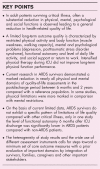Long-term outcome after the acute respiratory distress syndrome: different from general critical illness?
- PMID: 29189296
- PMCID: PMC5757654
- DOI: 10.1097/MCC.0000000000000476
Long-term outcome after the acute respiratory distress syndrome: different from general critical illness?
Abstract
Purpose of review: To review the current research data on long-term outcome and health-related quality of life in survivors of the acute respiratory distress syndrome (ARDS) and to compare these findings with those from non-ARDS patients surviving critical illness.
Recent findings: Between 6 months and 2 years after discharge from ICU, survivors of ARDS present with substantial impairments of the levels of body function (muscle strength, walking capacity and/or physical activity (physical SF-36 score). In contrast to non-ARDS patients from surgical ICUs, a standardized intensified physical therapy during early course of illness in ARDS patients could not show an improvement of long-term physical function performance. Furthermore, a substantial part of further ARDS patients suffer from depression (26-33%), anxiety (38-44%) or posttraumatic stress disorder (22-24%). In general, the level of functional autonomy and daily life activities was reduced, and in one study, 6 months after ICU-discharge this level was significantly lower in ARDS patients compared with non-ARDS patients. In a recent study, 44% of ARDS survivors were jobless 1 year after critical illness, whereas half of previously employed patients returned to work within 4 months after hospital discharge. General health-related quality of life was significantly reduced compared with a matched population in all studies.
Summary: Surviving ARDS is associated with a long-term substantial reduction in health-related quality of life and such a reduction does not differ from findings in patients surviving other critical illness. In further research, a special attention should be paid to prevention measures of the 'post intensive care syndrome' as well as to patient important domains, which might better explain the patient's and families' demands.
References
-
- Hashem MD, Nallagangula A, Nalamalapu S, et al. Patient outcomes after critical illness: a systematic review of qualitative studies following hospital discharge. Crit Care 2016; 20:345. - PMC - PubMed
-
A comprehensive and careful systematic review of the wide range of mental, physical, and social sequelae after critical illness, underlining the necessity of ‘core’ outcome variables.
-
- Shah HA, Dritsaki M, Pink J, et al. Psychometric properties of patient reported outcome measures (PROMs) in patients diagnosed with acute respiratory distress syndrome (ARDS). Health Qual Life Outcomes 2016; 14:15. - PMC - PubMed
-
This study reports on patient reported outcome measures and weights the importance and differences of PROM's versus ‘traditional’ outcome parameters.
Publication types
MeSH terms
LinkOut - more resources
Full Text Sources
Other Literature Sources
Medical
Research Materials


